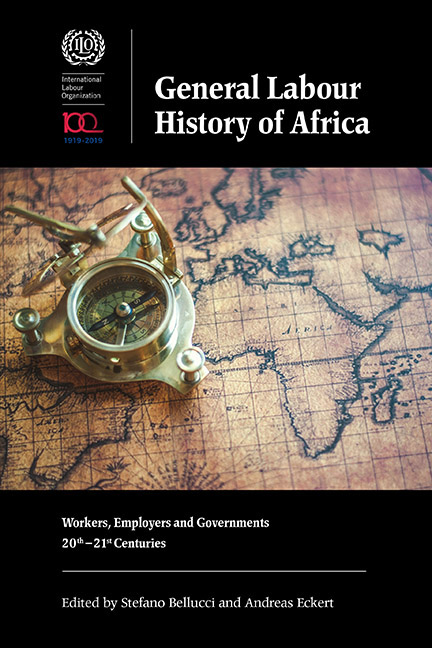Book contents
- Frontmatter
- Contents
- List of Maps and Figures
- List of Tables
- Notes on Contributors
- Foreword
- Acknowledgements
- The ‘Labour Question’ in Africanist Historiography
- Part I Free and Unfree Labour
- Part II Key Sectors
- Part III International Dimensions and Mobility
- Part IV Varieties of Work
- Part V Entrepreneurs and Self-Employment
- Part VI The State, Unions and Welfare
- Part VII Conclusions
- Select Bibliography
- Index
The ‘Labour Question’ in Africanist Historiography
Published online by Cambridge University Press: 21 September 2019
- Frontmatter
- Contents
- List of Maps and Figures
- List of Tables
- Notes on Contributors
- Foreword
- Acknowledgements
- The ‘Labour Question’ in Africanist Historiography
- Part I Free and Unfree Labour
- Part II Key Sectors
- Part III International Dimensions and Mobility
- Part IV Varieties of Work
- Part V Entrepreneurs and Self-Employment
- Part VI The State, Unions and Welfare
- Part VII Conclusions
- Select Bibliography
- Index
Summary
The year 2019 marks the centenary of the International Labour Organization (ILO). The General Labour History of Africa (GLHA) is the result of cooperation between the ILO and a group of Africanist labour historians who came together to write a history of African workers and work in Africa since the beginning of the twentieth century. The GLHA is intended, first, to contribute to a substantial understanding of labour in Africa throughout history and, secondly, to advance African labour studies by incorporating insights from the emerging field of global history and its variant, global labour history. Following the insights of global history, the GLHA is not the history of the making of the working class in Africa, but rather the history of the complex world of labouring people, which includes the industrial working class as well as many other categories. Indeed, the GLHA is the history of all working people, including affluent entrepreneurs, household labourers, careworkers, ‘informal’ workers and unfree workers.
In this introduction, we will provide a brief reflection and survey on African labour historiography in the last century. Our intention is to sketch the wider academic background to this volume, its main concerns, and its place within current intellectual debates. A comprehensive discussion of African labour history in relation to the GLHA project, based on the individual chapters, is provided in the conclusions to this volume by Frederick Cooper.
LABOUR HISTORIOGRAPHIES
In the first decades of the twentieth century, scholarly production on labour in Africa was closely linked to the agenda of colonial administrations. Studies on labour were preoccupied with the understanding of African social patterns and movements of people, and they were conducted under the auspices of colonial interests eager to control the African labour force. African labour was scarce and very much in demand for the mise en valeur and development of the colonies. It must be emphasized, however, that, until the 1930s, colonial officials and scholars alike conceptualized Africans usually as ‘natural peasants’ and were uncertain about whether Africans, even after decades of the ‘civilizing mission’, would work without direct coercion. Thus, hardly any effort was made to consider labour as a social issue. Typically, in the British colonial administrative apparatus, a ‘labour department’ did not exist, labour problems being usually handled by Native Affairs Departments. This situation remained substantially unchanged until the Second World War, which marked the beginning of decolonization.
- Type
- Chapter
- Information
- General Labour History of AfricaWorkers, Employers and Governments, 20th-21st Centuries, pp. 1 - 14Publisher: Boydell & BrewerPrint publication year: 2019



